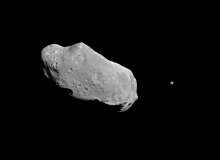

The idea of extracting resources held in asteroids in space is not new, and while it may sound like something from a fantasy movie, it has plenty of support, and no little ambition.
And now, with the essential element of interstellar ownership closer to becoming engraved in law, we may be nearing a time when idea becomes reality – although such a development is still likely to be years away.
The Space Resource Exploration and Utilization Act of 2015 states that any "asteroid resources obtained in outer space are the property of the entity that obtained such resources, which shall be entitled to all property rights thereto, consistent with applicable provisions of Federal law".
This marks an important step, allowing companies such as Planetary Resources and Deep Space Industries to keep the fruits of their labour – highly profitable minerals.
One of the reasons why such a bill is necessary is nicely summed up by Berin Szoka, head of the think TechFreedom tank. In a letter to the US Congress in May, Szoka warned that the technology for further space exploration would not be developed "unless investors know that they have enforceable rights to the fruits of their investments and the ability to operate peacefully without interference".
Comets no longer lie beyond the reach of industrial ingenuity.
Szoka’s point is at the heart of the space mining debate, for while many technology hurdles may have to be negotiated, it is the Outer Space Treaty of 1967 that has, arguably, represented the biggest challenge to date.
The treaty – signed by 102 nations – is the framework of international space law and states that outer space "is not subject to national appropriation by claim of sovereignty, by means of use or occupation, or by any other means". The treaty also adds that space is free for exploration by all states.
So, while the new bill would allow an entity rights over what it takes out of an asteroid, it would not then evolve into appropriation of said asteroid.
What next?
Planetary Resources, one of the big players in the industry, is now taking the first steps on its journey. The company’s Arkyd 3R satellite is currently aboard the International Space Station, from where it will be deployed into low-Earth orbit in July. For the following 90 days it will test the health of its subsystems and hardware, and send the data back to the Planetary Resources team in Washington.
And In September 2014, the Japanese Hayabusa 2 space probe was launched and is expected to land on the 1999JU3 asteroid in 2018. Its mission is to gather minerals and return to Earth.
Deep Space Industries also plans to build space craft for what it describes as ‘prospecting’ missions to near earth asteroids. The Firefly-class craft will be 30cm long and 15cm wide, described as ‘briefcase size’ by the company’s official website. They anticipate these missions will last for six months to two years.
But, what minerals could be mined from possible future missions? According to Planetary Resources, asteroids could provide ice / water, oxygen, iron, nickel, magnesium, gold and platinum. The company states on its website that one 500m platinum-rich asteroid could be home to more of these metals than have ever been mined on Earth.
One concern highlighted recently however is dust that could be created from the process. In a paper, Casey Handmer of the California Institute of Technology in Pasadena and Javier Roa of the Technical University of Madrid claim that 5% of escaped debris could interfere with satellites, with weak asteroid gravity contributing to such a situation.
So, despite the bill and the statement of progression it shows, there remain many unanswered questions. However, many will argue that space mining is rooted in reality as much as it is fantasy – a position that has only been enforced by the passing of the bill.



